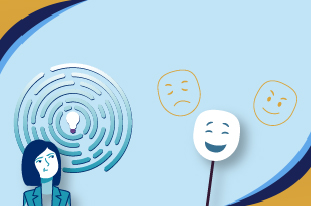Catatonic schizophrenia is a characteristic of one of the widely affecting mental health conditions “schizophrenia”. Schizophrenia typically impacts a person’s perception and mental health by making them see things different from the real world more commonly known as “psychosis”.
On the other hand, catatonic schizophrenia has its effect on the way you move in extreme ways. This means that you can be completely mute or still. And in some cases you may exhibit hyperactive behavior for no logical reason. The updated name of such a disorder is schizophrenia with catatonia signs or simply catatonic schizophrenia. To learn more, continue reading this blog as this blog highlights the most important aspects of catatonia schizophrenia such as the basic understanding, what is a catatonic schizophrenic, catatonic schizophrenia symptoms, some common catatonic schizophrenia example, catatonic schizophrenia causes, schizophrenia catatonic type, and catatonic schizophrenia treatment
Understand Catatonic Schizophrenia
Catatonic schizophrenia is a category of schizophrenia that involves the signs linked with catatonia. This subtype of schizophrenia has its own unique set of signs. Moreover, mental health experts do not identify it as a diagnosis, making it out of date. However, schizophrenia is considered as a spectrum of disorders including catatonic schizophrenia.
Read More: Beyond the Basics: Unfolding the Mystery of Specific Phobia
Catatonic Symptoms Of Schizophrenia
Catatonia can appear in a person in several ways. However, a significant sign of a person suffering from catatonic schizophrenia is seen as being in an unresponsive stupor even though you are able to move physically. Some of the commonly observed signs include:
- Not talking at all
- Gazing
- Mimicking someone’s behavior or speech repeatedly
- Feet tapping
- Sluggish response
- No movement
Diagnosis
Catatonic behavior schizophrenia is no longer seen as a loner diagnosis. Catatonic signs are seen to appear in mood disorders, bipolar disorder, dissociative disorder, psychosis, anxiety, specific phobia, and GAD autism, other than schizophrenia itself. However, it is widely diagnosed in schizophrenia. A mental health professional will diagnose a catatonic schizophrenia by first observing a person’s overall behavior and signs. The next step is to refer to the DSM-5.
Prevalence Of Catatonic Schizophrenia
No doubt, the term schizophrenia is common globally, but the impact is not so common. A rough estimate of the prevalence of about 85 people out of 10,000 show signs of catatonic schizophrenia in their lifetime. Globally, mental health care diagnoses almost 2.77 million on a yearly basis. Catatonia appears in a small but a noticeable percentage of people suffering from schizophrenia. Several researchers believe that it occurs in between 10 percentage and 25 percentage people already suffering from schizophrenia.
In What Ways Catatonic Schizophrenia Impacts The Human Body?
Catatonia in schizophrenia is such a mental health condition that hinders the way a normal brain works, particularly the processes linked with thinking and focusing abilities, making memories, senses, and much more.
Read More: There’s Something About Disruptive Mood Dysregulation Disorder That You Should Know (DMDD)
Primary Triggers Of Catatonic Schizophrenia
Researchers have not yet found the exact cause of manifestation of catatonic schizophrenia signs in a person. However, some of the theories have come forward in this context such as many mental health experts found out that the symptoms of catatonic schizophrenia have an abnormal activity in certain parts of the brain such as the forebrain, and hypothalamus that are responsible for the bodily movements.
The diagnostic record of schizophrenia catatonic shows that the illness usually begins in the late teens or young adulthood. Such a disorder has its impact on the sufferer from life long but if treated with the correct therapeutic approaches the signs can be eased.
Furthermore, if there is a family history of schizophrenia, then a person is more likely to suffer from catatonic schizophrenia. Drugs and alcohol consumption can also lead to the manifestation of signs of catatonic schizophrenia. The same happens with certain antipsychotic drugs and other prescribed medications that a person has been prescribed by a mental health disorder to treat the signs of mental disorder.
Treatment Methods To Treat Catatonic Schizophrenia
Schizophrenia is such a mental health condition that stays with a person for life long, however, catatonic signs do not persist for that long. Individuals suffering from catatonic schizophrenia demand a lifelong treatment, even when a person thinks the signs have disappeared and they feel recovered. Therefore, treatment is necessary and similar in every form of schizophrenia.
Some of the commonly implemented treatment methods include:
-
Benzodiazepines:
This category of drugs works as a tranquilizer and is widely used to treat the stubborn signs of catatonic schizophrenia. This particular medication is fast working and is usually administered intravenously (injected via vein). However, the only lacking point of such a medication category is the drug dependency if consumed for a long time.
-
Antidepressants and mood stabilizing drugs:
Individuals suffering from catatonic schizophrenia usually show the signs of other mental health conditions as well such as depression and mood disorder. Therefore, to treat the signs of such overlapping mental health issues antidepressants and mood stabilizers are used.
-
Barbiturates:
This type of psychiatric medication is identified as depressants or sedatives. Their primary function is to suppress the central nervous system. The effects of this particular category is mild sedation to complete anesthesia. Barbiturates instantly alleviate the signs of catatonia. Similar to benzodiazepines if taken for a longer period of time there is a risk of drug dependency.
Other Therapeutic Approaches
There are other treatment methods as well to treat the signs of catatonic schizophrenia. These include:
-
Electroconvulsive Therapy (ECT):
In this specific procedure, a mental health professional used a device to send an electric charge via the brain to manage the seizures. Moreover, ECT is applied when catatonic signs have not shown any improvement after the implementation of psychiatric drugs.
-
Psychotherapy:
For people suffering from signs of schizophrenia with catatonia medication is the primary solution. But, psychotherapy can be beneficial in reducing the signs as well. However, if the person exhibits severe intensity signs then this might not be the right treatment method.
-
Social Training:
A catatonic schizophrenic person often faces issues with their social life as well. In such scenarios, social training works best. A mental health expert can help the patient to learn about maintaining proper hygiene, prepare healthy meals, and improve their communication skills. Additionally, they may have support in finding a job, housing, and joining self-help groups.

Some Major Complications
If catatonic schizophrenia has been left untreated it can be a major cause of several issues in a person’s life. These issues can affect a person in several ways such as:
- Suicidal ideation
- Substance use
- Prison
- Smoking issues
- Family problems
- Problems in occupation
- Hygiene issues
- Malnutrition
- Depression
- Becoming a victim of crime
- Bad performance at school
Read More: Learning About The Connection Between OCD And Eating Disorders
Wrapping Up!
Schizophrenia is a serious psychological condition that stays with a sufferer for a long time. However, life becomes tough when schizophrenia is linked with catatonia. The catatonic state schizophrenia can severely impact a person’s brain functioning by disrupting the signals going to the brain and making the person freeze for a longer period of time. However, such subtypes can be treated with the help of some treatment methods such as psychotherapy, psychiatric medications, and ECT. So, if you think that you or any of your loved ones are suffering catatonic schizophrenia then now is the perfect time for you to get help from telehealth Orange Coast Psychiatry.


















